Peter MALONE
Saturday, 18 September 2021 19:24
Green Light, The
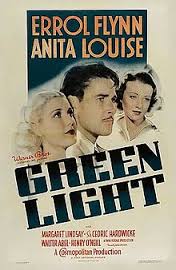
THE GREEN LIGHT
US, 1937, 85 minutes, Black and white.
Errol Flynn, Anita Louise, Margaret Lindsay, Cedric Hardwicke, Henry O'Neill, Spring Byington.
Directed by Frank Borzage.
The Green Light is adapted from a novel by Lloyd C. Douglas, author of Magnificent Obsession, White Banners, The Robe, The Big Fisherman. While Magnificent Obsession had been successfully filmed in the '30s, the main Douglas films were to emerge in the '50s. This is a more modest production. It is one of Errol Flynn's earliest films, coming soon after his success in Captain Blood. He gets sympathetic support from Anita Louise and Margaret Lindsay. Cedric Hardwicke plays a radio and pulpit preacher, stricken by polio, but speaking in the typical '30s other-worldly Christian piety. The film is melodramatic, highlights the self-service of doctors with integrity. It has dated considerably, but, of its kind, it is an enjoyable preaching melodrama.
1. Popular entertainment? The medical profession? Personal crises?
2. The work of Lloyd Douglas? His background as a preacher? Medical background? A popular combination of both? Themes of medicine, healing, personal integrity, religion, the questioning of religion?
3. The production values: black and white photography, Errol Flynn as star? The atmosphere of hospitals? The atmosphere of the Rockies and medical research?
4. The title and the meaning given it by Dean Harcourt, the challenge and the impetus to go ahead? The visual use of the traffic lights as the green light symbol?
5. The focus on Newell Paige: Errol Flynn and his style, his dedication to his work, his relationship with Frances Ogilvie and her devotion to him? Mrs. Dexter and his talks with her? His respect for her religious beliefs? The encounter with Dean Harcourt? The urgency of the operation, Dr. Endicott failing to arrive? His decision to go ahead with the operation, the failure, Mrs. Dexter's death? His silence and accepting responsibility? The confrontation with Dr. Endicott? The medical judgments on him? His being supported by Frances? The chance encounter with Phyllis Dexter, his being introduced as Mr. Walker, her attraction towards him? The outings, sympathy? The drive, the dog Sylvia, her realisation of the truth and her rejection of him? His discussions with Dean Harcourt? His leaving, travelling to trick, Rockies, the encounter with John Stafford and his research? The difficulties with Spotted Fever, his contracting the disease? Phyllis and Frances coming to him, Dr-Endicott? helping, John Stafford helping? His triumph over the illness? A typical hero of this kind of '30s novel and film? Unreal - but attractive to audiences? For understanding the issues?
6. Frances Ogilvie as a fine nurse, her devotion to Paige, her helping him in the operation, her criticism of Dr. Endicott, her allowing Paige his freedom and silence? The visit to Dean Harcourt, the encounter with Phyllis Dexter, the chance meeting with Dr. Paige and her introducing him as Mr. Walker? The dinner and Phyllis' discovery of the truth? Her going to help him in his illness? The contrast with Phyllis Dexter, in London, her devotion to her mother, her mother's death, the return, her anger at the doctors, the discussions with Dean Harcourt? The encounter with Paige, her attraction towards him? Her rejection of him? Her coming to his help, the happy ending?
7. Dean Harcourt and his contracting of polio, his determination to go on, his radio and pulpit preaching? Cedric Hardwicke's serious and pious style? The touch of the pompous other-worldliness? The response to such religion in the '30s? Later? His helping Paige, Frances, Phyllis? Their prayer in the cathedral? His allowing them to be themselves? The finale with his walk from the pulpit?
8. Dr. Endicott and his concern about money, his being late for the operation, its failure, his not taking responsibility for Mrs. Dexter's death, with the Board, not blaming Paige but not exonerating him? His subsequent misery? His eagerness to come to Page's help in the Rockies?
9. John Stafford and his research, the attitudes of the researchers to the surgeons and vice versa? His going to the Rockies, people's suspicion, the Spotted Fever and its toll amongst the people in the town? Their hostilities? Dr. Paige and his visits, helping people, contracting the disease, the experiments and research for his recovery?
10. The appeal of the medical film? Audience interest and identification? The mystique of the doctor? Strengths, failures? Responsibilities?
11. Audience response to religious themes? The preacher and the appeal to positive values, positive attitudes?. The optimism of this kind of religion?
Published in Movie Reviews
Published in
Movie Reviews
Tagged under
Saturday, 18 September 2021 19:24
Greengage Summer, The
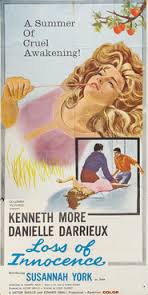
THE GREENGAGE SUMMER
UK, 1961, 99 minutes, Colour.
Kenneth More, Danielle Darrieux, Susannah York, Claude Mollier, Jane Asher, Maurice Denham.
Directed by Lewis Gilbert.
The Greengage Summer (Loss of Innocence) is a charming and engaging film. It is based on the novel by Rumer Godden. It introduced Susannah York in a star role - and indicated her strong screen presence and her subsequent career. She has excellent co-stars in Kenneth More with his genial style and Danielle Darrieux as French and aloof. The film is beautifully photographed in the French Champagne countryside. It has a pleasing score by Richard Addinsell and was directed by Lewis Gilbert whose film credits range from British comedies and dramas and war tributes in the '50s to some James Bond films in the '60s to such blockbusters as The Adventurers and humorous entertainment like Educating Rita.
1. A film of charm? Entertainment? Point?
2. The title and the focus on the Greengages, trees and beauty, nature, summer? The alternate title as a subtitle and indication of theme?
3. The credits and their prettiness, colour, the introduction of the Champagne countryside,, romantic, the chateau, Paris? Richard Addinsell's light attractive score?
4. The surface prettiness and the audience being led deeper with the experience of Joss? Disillusionment, growing up? The food for memory?
5. Susannah York as Joss, the schoolgirl with the children. their mother's illness, the hostility at the hotel, her initial illness, age, sexuality? The holiday? The encounter with the proprietress and her assistant? Elliott and his growing charm. attractiveness. the exhilaration of the outing, the beauties of Paris, his humour and wit? Her jealousy? His attraction towards her but seeing her as young? Her being hurt? The drunk scene? Paul and his infatuation? Suspicions of Elliott, sending the photo? Paul's attack, her being rescued by Elliott, Paul's death? Her confessing the truth to the police? Her outburst against the hotel and the evil there? Her uncle, the telegram, the final gesture by Elliott? The final sequence and her wandering amongst the Greengages? An adolescent girl, change, becoming an adult, pettiness and immaturity, the change to womanhood? The influence of the characters? Her memories?
6. Hester and her age, primness, fascination by everything, girlish behaviour. shrewdness about Elliott? The initial fight with Paul. becoming friendly with him? Her enjoyment of the outing? The experience of the holiday? Friendship with Joss and comparisons with her? The sketch of the other children?
7. Kenneth More's affable charm as Elliott? The Englishman in France? His aplomb? Helping the children initially, delighting in their presence, a father-figure? The girls' fascination with him? His relationship with the proprietress? The suspicions about his hiding away, no photos, absences, the barge? The clashes with Paul? The infatuation with Joss? His hurting her unwittingly? Rescuing her at the dance, in her room? The truth and his handling of it? His escape? The gesture of the telegram?
8. The proprietress and her background, ownership of the chateau, management, shielding Elliott? Her infatuation with him? Jealousy? Her treatment of the children? Rebuking them? Her manager and the manager's infatuation with her? Jealousy? The highlighting of the relationship between the two women? The sketch of the staff?
9. Paul and his initial fight with Hester, his hopes for the truck, infatuation with Joss, the drinking sequence, humiliation at the dance, the attempted rape, the fight with Elliott, his death?
10. The uncle and his rescuing the children? The role of the police?
11. The holiday atmosphere, the guests, the tourist style of so much of the film? Happiness - yet sadness? Regrets? The loss of innocence?
Published in Movie Reviews
Published in
Movie Reviews
Tagged under
Saturday, 18 September 2021 19:24
Green Eyes
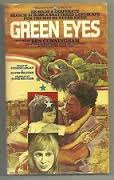
GREEN EYES
US, 1977, 100 minutes, Colour.
Paul Winfield, Rita Tushingham.
Directed by John Erman.
Green Eyes is an impressive and effective telemovie full of strength and sentiment. It is a story of the aftermath of the Vietnam war and highlights American responsibility to the Vietnamese. Filmed convincingly in Manila, it re-creates the atmosphere of suffering in the area and the dangers of callous neglect after it. Paul Winfield gives an excellent performance and is paired with English Rita Tushingham in an offbeat role.
Direction is by John Erman, a television director who also directed the remake of Somerset Maugham's The Letter with Lee Remick and Jack Thompson. This telemovie can be compared with My Husband Is Missing, with Sally Struthers, where she goes to find her missing husband in North Vietnam. These are human statements which can be seen in the light of The Deer Hunter and Apocalypse Now as well as the group of 30 or so movies highlighting the Vietnam war.
1. The impact of the films on Vietnam throughout the '70s? The war as background to dramas? Americans and their attitude towards the involvement? The experience of war? The late '70s and the critique of the involvement? Suffering? The impact of the withdrawal of the troops? The fall of Saigon? The danger of Americans forgetting? The film and its appeal to conscience?
2. Its impact as telemovie? Strength of the plot, audience involvement, geared to the home audience?
3. The film's attitude towards the war itself? Background to the war? American involvement? The lack of awareness of the Vietnamese and their traditions? The battle scenes with the American troops and their ignorance? The relationships between the troops and the local women? The number of children born, orphaned? The orphanages and trying to cope after the withdrawal? The responsibility of the American fathers and their families?
4. The film's highlighting the plight of the Vietnamese, begging and scrounging for a living, the taxi driver and his attitudes and advice.. the children roaming the streets and hustling? The film's focus on Trung and his cheeky hustling? The babies and small children in the orphanages? The women and their liaisons, prostitution? The contrast of the hero with Noel and his disappearing and hustling? The contrast with life and affluence at the embassies? The social needs, help, do-goodism?
5. The hero's return from the war? The official announcements and pride of the returning troops? His friendship with Noel and visiting his family? The irony of what really happened to Noel and the pathos of his parents grieving? The return home, resumption of family life, the mother with her money and its being used for the search in Vietnam? Interviews for jobs and their not being available? The film's comment on society's attitudes towards the returning veterans?
6. The highlighting of black families and their reaction to the war and the returning veterans?
7. The dramatic impact of the search? The arrival in Saigon, the taxi driver, the interviews with the women, Trung and his robbing, Margaret and her tour of the orphanages and highlighting the poverty and death?
8. Trung and his leads, the contact with Noel, the money to search for the woman and her child, the eventual discovery - and the news of the death of the baby? Trung as an image of the dead child? The second child who was alive?
9. Margaret and her work, the importance of the party sequence with the healthy and wealthy guests, throwing the food to the starving children? The hero and his help, his staying and giving his services for the Vietnamese - atonement?
10. His returning home, sense of responsibility, Trung and his becoming the child with green eyes?
11. The universal message about war, individuals, exploitation, conscience, responsibility? Impact for American audiences with direct experience of the war? For wider audiences?
Published in Movie Reviews
Published in
Movie Reviews
Tagged under
Saturday, 18 September 2021 19:24
Green Bird, The
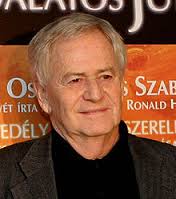
THE GREEN BIRD
Germany, 1980, 94 minutes, Colour.
Hannelore Elsner, Peter Andorai, Krystyna Janda.
Directed by Istvan Szabo.
The Green Bird is a West German production by Hungarian director Istvan Szabo. Many of his Hungarian technicians and his leading actor worked with him in this film. It is a familiar story: a relationship that endures for many years, despite the marriage of the hero. What makes it different is that the hero is a Pole, the heroine a West German. They meet at medical conventions every so often. The film traces (with constant allusion to political situations of the '60s and '70s) of their relationship. While the ingredients are those of soap opera, the treatment is understanding and humane. Szabo made many fine Hungarian films in the '60s and '70s e.g. Confidence and then went on the award-winning Mephisto.
1. A humane story, love story, sad and happy relationship story? A portrait of love and pain? The reality of the film, its authenticity - and open-endedness?
2. The work of Istvan Szabo: Hungarian films, perspective? His work in the West? Germany and Poland as the countries of his screenplay? The importance of the background of way of life in East and West? Freedom and lack of freedom? The relationship and its being a symbol of the relationships between East and West? The local interest of the film? Universal impact?
3. The portrayal of Europe: Poland and Warsaw: Germany, Austria, France: the cities, hospitals. hotels, restaurants, scenic beauty? The importance of the silent and contemplative visit to Auschwitz?
4. Editing and pace: the sprightliness of the encounter, the light touch of the initial years, the contrast with the domestic scenes at home, as the affair moved into longer years, the longer pace of various sequences? The brevity of quick encounters? The communicating the differing tempos of the various years as they passed?
5. The title, its use, reference to Renate? The references throughout the film? Images? The elusiveness of the green bird?
6. The credibility of characters and situations? The encounter, the progress of the affair. the passion. the effect of time, the dilemmas for Jan and Renate. the companionship, the friendship, the breaks, new decisions, failure to make decisions, ageing, the passing of time - and the continuing relationship?
7. A portrait of passionate emotion: from encounter, infatuation, love, passion, deception, selfishness. sacrifice, loss, envy. jealousy, trust, attempts to build anew?
8. The voice-over technique and its inviting the audience to understand - and partly distancing? overcoming the difficulties of the use of English and French, German and Polish? The screenplay focused on Jan? The screenplay's presenting the situations as fact - almost without judgment? Editorial judgments on the characters? The portrayal of Katzka as a point of reference?
9. The importance and emotional overtones of the relationship as a symbol of East and West? Ways of life, ideologies, personal freedoms , pain of separation? The symbols portraying this e.g. the transit lounge and the glass wall between Jan and Renate?
10. The portrait of Jan in himself: career, the film taking his success for granted, language, passion, cold relationship with Katzka, deceiving but never hurting her, passion for Renate, sharing and passing the time with her, the visit to Auschwitz, transit lounges, formalities and informalities, the various meeting places, the presence of Werner, the tears, the marriage, Annette and his playing with her, the breakdown of the marriage and the resumption of the affair? Age - as symbolised by Renate's comment on his eyes?
11. Renate in herself, her work, attractiveness, response to Jan, decisions, the visit to Auschwitz, so much sharing, the passing of the gears, the pain, seeing her at work, the relationship with Werner, the social with the two husbands and wives, the growing friendship with Katzka, the correspondence and its lapses over the years, the cards, the birth of Annette? Re-meeting Jan and the break-up of the marriage to Werner?
12. The sympathetic portrait of Katzka - and her reading the news, her relationship with Jan, her not suspecting, illness. meeting Renate, friendship? The contrast with Werner and the bond with Renate -but his self-preoccupation?
13. The importance of the historical background - the portrayal of the major world events over the '60s and '70s? Situating the love story on the political world?
Published in Movie Reviews
Published in
Movie Reviews
Tagged under
Saturday, 18 September 2021 19:24
Green Berets, The
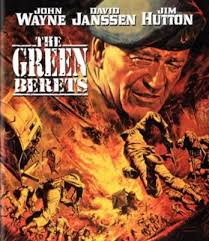
THE GREEN BERETS
US, 1968, 141 minutes, Colour.
John Wayne, David Janssen, Jim Hutton, Aldo Ray, Raymond St. Jacques, Jack Soo, Bruce Cabot, Patrick Wayne, Irene Tsu, Jason Evers, Luke Askew.
Directed by John Wayne.
The Green Berets was a Hawk's optimistic view of the Vietnam war at the end of the '60s. It was a special project by John Wayne and his company. The writer was James Lee Barrett, writer of many westerns for this company. Wayne co-directed with Ray Kellogg. Many of his usual acting team worked with him in this film. It is a statement of American involvement in Vietnam, a looking at the American involvement in the eyes of the atmosphere of World War Two and the Americans coming to the rescue of a beleaguered world.
There is an acknowledgement that there were many questions about American involvement and that it was another kind of war. However, Wayne's film shows the war in action and lets that speak for itself as a reason for American involvement. The argument is very much on an emotional level of the experience of battle and using such characters as young boy orphans. The pros and cons of the war and American involvement are not analysed at all. There is a patriotic spirit about the film. This is especially the case in the song for the credits and the ending - where the sun actually sets in the east! John Wayne does his usual sturdy job in the central role - and the screenplay with its battles, officers, heroics is very reminiscent of the traditional war films as well as of westerns.
1. The reputation of the film in the '60s - John Wayne and the Americanism that he stood for, the correctness of American involvement in Vietnam, the perspective of the '60s,, the American perspective in comparison with the rest of the world? The purpose of the film? Propaganda, morale-boosting?
2. The effectiveness of the film as entertainment? The traditional war films and westerns? American action and sentiment? Heroism? How effective the propaganda, morale-boosting?
3. How does the film seem in the light of history, the analyses of the Vietnam war, the late '70s film criticisms of American involvement and of war?
4. The film as a John Wayne production, his personal involvement, the length of the film, Panavision, colour photography, the rousing Miklos Rosza score (echoing the score for such epics as Quo Vadis and Ben Hur)?
5. The film's use of the conventions of the war genre, of the western? The background of the popular World War Two films, their style, battles, heroism? Making the Vietnam war familiar to the audiences?
6. John Wayne and his appearance in westerns? The parallels in plot, characterisation? The use of western and war genres as helping the audience to understand the Vietnam war?
7. American heroics, the presupposition that America would win? American skill, know-how, weapons, aid? America’s role in the world as seen by the makers of the film? The overall view of American strength and presence in the world? As a confrontation to the communists?
8. The atmosphere of the song at beginning and end? The role of the Green Berets? The quality of this crack corps and its American presence? Confidence?
9. The dramatics of the opening - the journalists and their acknowledgement of the questions and debates, the type of answers offered? The character of Beckworth? His cynical asking of questions, aligning himself with newspaper questions about the war, the answer given by Kirby? His visit to Vietnam, his being shown round, his being involved in the battle? The credibility of his enlistment, conversion? Symbolising the intended effect of the film on the American public?
10. The skill of the Green Berets, their morale, training? Their seeming brainwashed in giving an account of themselves and their capabilities? The answers to the questions - especially those of Sergeant Muldoon? The corroboration of Doc McGee? Provo and his intensity,, asking for permission to go into battle, his preoccupation with the memorials?
11. John Wayne’s style as Kirby? The initial meeting? His being sent to Vietnam, the takeover and the friendship with Colonel Morgan? His reliance on McDaniel?, Muldoon? Provo? His skill with the men, his attitudes towards the war, American involvement? John Wayne's place on the screen, his statements in the '60s about Americanism?
12. How well did the film present Vietnam? Did it enable the audience to see the country, its questions, the nature of the war, the attitudes of the people? The impact of the war and the fighting, life in Saigon, the Viet Cong and their tactics? The explanations given, the remarks made - and the style of World War Two movies?
13. The impact of the siege - the staging of the battle, the scope and magnitude of the attack, the involvement of troops, Kirby coming in by helicopter and its crash, the Viet Cong, the weapons used? The World War Two style to present the battle? Audiences readily identifying with what was going on, understanding it? Beckworth's involvement?
14. The presentation of the mission - the Green Berets and their commando skills, the girl and her connection with the General, with the family? With Colonel Cai? The moral questions for this Mata Hari type? The set-up of the raid? The skill of the raid?
15. The task force and Kirby's going, leadership the escapes? The woman leading the General to the villa? The arrival at the villa, the killing of the guards, entering the house, kidnapping the General, the escape? The bridge and the explosion? The wounded, especially Doc, Provo, Petersen's death?
16. The importance of the character of Petersen, his initial scrounging, being seconded by the Green Berets, his friendship with the boy, the little boy during the siege and the death of his dog, Petersen's adopting him, Petersen's death, the boy searching the helicopters at the end, Kirby going with the boy towards the beach at sunset? Human interest, sentiment? A symbol of American help in Vietnam - protecting orphans? Avenging them?
17. The film's reliance on sentiment? Its expectations for American involvement, American aid? Attitudes towards the communists, Russia and China?
18. The quality of the film as entertainment? As a document of American attitudes in the '60s? In the hindsight of the end of the Vietnam war?
Published in Movie Reviews
Published in
Movie Reviews
Tagged under
Saturday, 18 September 2021 19:24
Greed
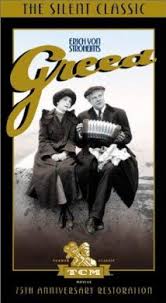
GREED
US, 1924, 130 minutes, Black and White.
Gibson Gowland, Jean Hersholt, Zasu Pitts, Chester Conklin.
Directed by Erich Von Stroheim.
Greed is a classic silent film directed by Erich von Stroheim. Originally an ambitious work running for nine hours, the film was edited down to two hours. Set in the 20s in America, it shows ordinary people overcome by greed. Thus it is a moralising fable about American dream and ambitions. Showing a flair for silent film, von Stroheim creates many memorable images even though by later standards the sequences, seem contrived. Zasu Pitts, usually a comedienne, is effective in the central role. Greed is an interesting example of silent film-making as well as a good example of the moralising silent cinema.
1. The reputation of this film? Considered a classic? Reduced to two hours from a reputed ten hours. Is there evidence of such a reduction in the finished film? The reputation of Erik von Stroheim? His bitter style, extravagant style? The personal direction? The dedication to his mother?
2. The standard of silent films of 1924: quality of black and white photography? photographic styles and fixed camera, final panning in Death Valley? The titles and their style of English, the written presentation of American slang? Styles of acting, stage acting, melodramatic and contrived? Appropriate for communicating without sound and words?
3. The didactic tone of this kind of film and the entertainment value? How well did they combine? Were they at all in conflict? The titles and the moralizing tone? The patronizing of the audience, the patronizing of the characters by comments on their behaviour, words and attitudes, eg. Mack and his not thinking? The speculations and moralizing about greed?
4. A portrait of America, greed in America, the root of all evil? A reflection of America in the early decades of this century? As in a novel by an American, adapted by an Austrian resident in America? The emphasis on migrants? A migrant and outsider interpretation of America?
5. The initial caption about truth and its being hard-hitting. Was this film hard-hitting for the audience expectations of the time? How acceptable?
6. How well exemplified and explored was the them of greed? The initial presentation of the verses about gold, the mining of gold? Mack's origins in the gold-fields? The visual presenting of gold throughout the film, Trina's polishing the gold and sleeping with it? Money as the root of all evil?
7. Facets of the theme of greed: the fact of money, motivations for having money, money and the mania, miserliness? The role of chance and luck? Lotteries? (And the indication that they were against the law?) How much is man's destiny freely chosen, fated, how much under his own control? The role of choice? Power of one person over another?
8. The 1908 setting: McT at work, his gentleness with the bird, his pushing the man over the rail? The background of mining? His mother and her ambitions, her vision of him as a dentist, her pushing him into a different career? Her motivation, hope for bettering himself, money? Should she have pushed him?
9. The transition to San Francisco and the visual presentation of the city? Mack as a personality, genial, not so intelligent? His working as a dentist and his skill? Lack of qualification? His possibilities in life? A plain kind of man, not a thoughtful nun, prone to anger and mods, a capacity for love? The comments on his good and evil hereditary?
10. The introduction to Marcus and his man-about-town style, his work as a vet, his bringing Trina to the dentist? The bonds of friendship, the quality of friendship? His giving in to Mack about Trina, the nobility of his gesture? How much was it meant? But the deep resentment, triggered off by the greed? The drunken scene and his hostility and throwing the knife? How deeply felt was the hatred for Mack? The irony of his going off to the West? The image of the cat and the birds? His meanness, his writing the letter and ruining Mack and Trina? The importance of the build-up to his final confrontation with Mack? An ordinary man with good and evil deep down?
11. The film's focusing on Mack and presenting him as an ordinary man, weak, loving, overpowered - the significance of the encounter with Trina, the sequence in the dentist's chair after the administration of ether? His decline as she became meaner, lack of ambition, hatred and violence? Credible in an ordinary man?
12. The film's focusing on Trina: our first seeing her, her simplicity and attractive nature, hesitation in buying the lottery ticket, going to the dentist, the nun-like presentation as she sat unconscious in the dentist's chair, her innocence and her fears, her enjoyment of the outings, shyness? Their sitting near the sewer, the playing of the accordion, their singing, the rain? The build-up to the engagement, the theatre party, the party itself? The joy of the wedding, her sorrow at her family's going, her fear of the wedding night? The possibilities of her being a good wife, mother? Her place within her family? The detailed portrayal of the family when they were met for the picnic, at the wedding? (The greediness of the banquet scene?) Father as the migrant, kind mother, the children and their being disciplined? The unattractive sister and the organ playing? An ironic touch about the migrant family - too severe?
13. Trina and her interior meanness, the situation drawing out her hardness, the emphasis on her mean face, her gestures and her finger on her lips? Her lying, cheating, starving, being prepared to slave? Her fantasies and fondling the gold? Her cruelty, making Mack walk in the rain, turning him out, the long sequence of buying the chops at the Semite market? The significance of this?
14. Trina at how, counting her money, polishing it, working? Mack at home, and his dependency? Sense of failure, being fired, drinking with his friends? The significance of the stinking meat sequence? His leaving and her hypocrisy?
15. Marcus and the irony of their behaviour at his final visit, the cat and the birds symbolizing what was going on? The aftermath and the effect on Mack, Trina?
16. Her work, resentment against Mack and his leaving, the night and her lying with the money, turning him out and the consequences of his coming back and his killing of her?
17. The Death valley sequences and the change of atmosphere? The contrast with so much rain with the sun and the dryness of the valley? The posse, Marcus volunteering and going against warnings to go into Death Valley?
18. The final irony of the face-to-face confrontation, the lack of water, animals, the handcuffing?
19. The symbolism used of gold, rain, the cat and the birds, Mack letting the bird go free but it was dead? The cuffs?
20. Effective and enjoyable melodrama, the epic proportions intended by the director? A silent film classic?
Published in Movie Reviews
Published in
Movie Reviews
Tagged under
Saturday, 18 September 2021 19:24
Great White
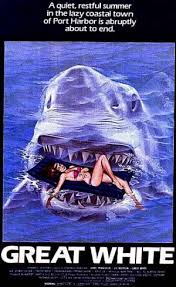
GREAT WHITE
Italy, 1981, 88 minutes, Colour.
James Franciscus, Vic Morrow.
Directed by Enzo G. Castellari.
Great White is an imitation Jaws. In conception, writing, characterisation and advertising, it played on the original film. This film was the subject of court action throughout the world. In Australia, an injunction was made to withdraw Great White from commercial release. American stars James Franciscus and Vic Morrow do competent jobs in the central roles. However, many of the cast are dubbed. The film shows how the basic synopsis of Jaws can be presented in a sensationalist way in an hour and a half. The interest of this film is in the areas in which Jaws captured audience interest: the shark itself and its preying on people, the obtuseness of the humans, the final confrontation of the shark.
1. The impact of Jaws in the mid-'70s? Its impact as entertainment, in terms of realism, in terms of the symbol of confrontation between man and monster? The many imitations? The quality of this imitation? Its using the original's basic outline - improving it in any way?
2. Italian production qualities: the United States, Malta? The stars? Location photography? Special effects with camera work? The presentation of the shark? Stunt work? The emphasis on violence?
3. The following of the Jaws plot and characters? The youngsters and the swimming, the competition, the adults and their concerns, authority and political ambition, crowds coming for entertainment and being in danger, the calling in of experts, hunters? The various deaths? Crises? How well treated? The danger of cliche?
4. The suggestions of the American lifestyle: Welles and his ambition, his son, unscrupulous politics, the concern for the protection of the visitors, the net in the harbour? His aides and their advice? His grief? Acknowledging his mistake? His going out to confront the shark in his helicopter? The ugliness of his being bitten in half, etc.?
5. Benton as hero? His authority about sharks, daughter and wife, his reaction to the situation, advice given, the diving and the rescuing, his daughter and her amputation, his vengeance against the shark, his finally killing it?
6. The hunter and his warnings, the protection of the harbour, the diving, the fight with the shark, his death, the explosives on his body killing the shark?
7. The picture of American youth: wind-sailing, competitiveness, the youngsters killed by the shark? Youth style, songs, recreation? Terror and deaths? The people on the boat, on the float?
8. The aides and their deaths? The unscrupulous television man and his wanting to film everything (as were the film-makers themselves!)?
9. The picture of the city, the ordinary characters - children, wives, officials?
10. The reasons for making this film - entertainment, exploitation?
Published in Movie Reviews
Published in
Movie Reviews
Tagged under
Saturday, 18 September 2021 19:24
Great Waldo Pepper, The
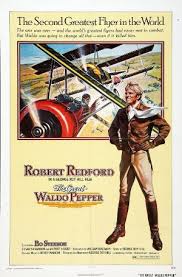
THE GREAT WALDO PEPPER
US, 1975, 108 minutes, Colour.
Robert Redford, Bo Svenson, Susan Sarandon, Geoffrey Lewis.
Directed by George Roy Hill.
Most audiences should enjoy this film. Robert Redford, oozing charm, plays a star pilot of the 20's whose horizons are the sky and aerial skill (beautifully and excitingly photographed.) But he is a dreamer, too late to be a hero of the personal dogfights of World War 1, caught in a fading career of aerial spectacle before aviation became functional. He tells a dream of his fighting a battle in the war; and the charm and optimism of the film lies in his being able to live his dream in a Hollywood re-creation of the war. An entertainment, a Hollywood myth, a wonderful wish-fulfilment fantasy.
1. The tone of the title and the emphasis on greatness, the photos at the beginning and the end. the mythical aspects of a hero?
2. How did the film explore the theme of greatness: the greatness of Waldo's dreams, their unreality. the ambitions. in the fulfilment of fantasy in the final achievement of dreams? How real was the exploration? How idealistic? How delightful was such an exploration of an ideal?
3. How well did the film communicate the atmosphere of the air? The aerial photography. the experience of flying. the exhilaration of the small plane. the tricks in the air. the dangers, the thrills, the potential for damage and destruction? The background of the first World War and the pioneering? The challenge of the battles and their excitement? The skill? The effect on the pilots?
4. The film's comment on the First World War: a pioneer war in the air. personal warfare, the heroism of the stories and the mutual admiration ? What personal flavour did this give the memory of war? The war in the air as seemingly remote from the harshness of trench warfare? The world of heroes and dreams?
5. The film's emphasis on Waldo telling the story so many times: the very lengthy recounting of the story to the family, his telling it to the girlfriend and its being interrupted and the truth being told, the dream being told at the end when it became a true story? What did the story of this combat symbolise for Waldo? And the fact that it was fulfilled?
6. How attractive a man was Waldo? Robert Redford's charm and personality? The presentation of him doing his job? His making people happy? The joy of the rides? The devotion of the boy with the petrol and taking him for the ride? What kind of romantic hero did Waldo Pepper stand for?
7. The realities of the '20s: jobs, times changing, the clash with the rival pilot? The callous overtone of the con-man in Waldo Pepper?
8. How enjoyable were the sequences in the aerial fair? The training, the tricks, the comradeship The attitude of the manager? His dramatising of the dangers? His cynical comments about the audience? The people and their response to danger? Did they really want death?
9. The attractiveness of the girl? Her relationship with Waldo and his companion? The eagerness of her wanting top billing? The nature of the stunt? Her being frozen in fear? The suddenness of her death? what did the film say were the consequences of her death? How did they highlight the harsh realism behind the romantic unreality?
1O. The importance of the sequences of Waldo at home? The support at home and yet his wandering? The closeness of his friend in building a plane for him? Their desire to be champions with the loop? The contrast of the domestic sequences and the excitement of his career? His inability to settle?
11. The drama of the loop and the plane crash? Waldo’s horrified reaction and his attack of the people? Did the audience share this horror and Waldo’s attack of the audience?
12. Did the audience support the supervision of Waldo's flying and banning him from the air? Was this necessary in the mid 20s? Was it too dangerous for men like Waldo to fly? Would they jeopardise the growing air industry?
13. How enjoyable were the Hollywood sequences? The portrayal of the silent films and their making? The comedy of the stunt men?
14. How important were the encounters between Waldo and the German Air-ace? The humanity and the friendship of their discussion of the manoeuvres in the war? Their reconstructing the challenge and the battle for the film? The irony that film-making can recreate a situation and let people live it again? Or live it for the first time? The film as being able to give reality to a fantasy works? The enjoyment of the battle? Its appropriateness as a climax for the film? The effect on each of the protagonists? On Waldo's friends and the supervisor?
15. What were the major themes for this film? In terms of humanity. dreams, heroism?
Published in Movie Reviews
Published in
Movie Reviews
Tagged under
Saturday, 18 September 2021 19:24
Great Scout and Cathouse Thursday, The
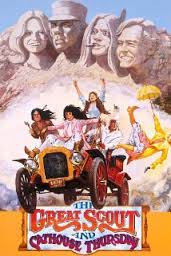
THE GREAT SCOUT AND CATHOUSE THURSDAY
US, 1976, 92 minutes, Colour.
Lee Marvin, Oliver Reed, Robert Culp, Elizabeth Ashley, Kay Lenz, Sylvia Miles, Strother Martin.
Directed by Don Taylor.
The Great Scout and Cathouse Thursday is not pretending to be more than a fairly raucous vulgar footnote to the changing West. This comedy offers quite an amount of unsubtle humour and is good for some rowdy laughter. It's the grizzled old timers (and who more grizzled than Lee Marvin?) up against the newly rich swindlers, especially in a funny robbery sequence whose success depends on a box of wasps. Oliver Reed, of all people, is a half-breed, half-bred Indian helping Marvin mug his way through. It is all done with a naive belief in its own funniness and sentiment that it gets away with its vulgarity fairly humorously and inoffensively.
1. The quality of the film as a comedy? Its values and stances? The nature of its audience appeal?
2. The comic illustrations of the credits? The music and song? The film's use of colour, sets, re-creation of turn of the century western atmosphere? The importance of these for the film's impact and success?
3. The humour of the title? The indication of western types? The two characters as the most important in the film?
4. The importance of creating atmosphere and tone with the con trick of the snake? Billy and Sam and their tricks?
5. The film's focus on Sam, the explanation of his background as an American hero? The ageing American he-roes and their grizzled look? The strengths and weaknesses of his character? How appealing a character? His claim to the money, his way of life, the challenge to Jack Colby and his defeat? His desire to get his money back? The motivation for his actions during the film? His toughness and tenderness? what kind of American hero of the West?
6. Sam's contribution to the kidnapping of Colby's wife, the planning of the robbery, the humour and excitement of its execution, the chase? His love for Thursday and his return to her? The importance as well as the comedy of his fighting Jack Colby?
7. How attractive a western heroine was Thursday? Her background of being a whore, her being a victim of mike and circumstances? The importance of her escape, the pursuit by Mike? Joe Knox's interest in her? Billy's? Her response to Sam" Telling him lies about his heroism (the effect of his burning his scrapbook?), the humour of her plan in tricking Jack Colby out of his money? Her participation in the robbery, her being captured, the importance of her leading on the pursuers, her being rescued? How attractive a naive young heroine for the film? An American character of the West?
8. The satire in the characterisation of Joe Knox? His explanation of his heritage and birth, Indians and whites? His Harvard education and yet his ill-bred style? His exploiting of his venereal disease? The vulgar humour of his cure? His drinking, threat to the world with the V.D., kidnapping the whores? His relationship with Sam, Jack Colby and Billy? His being defeated by Jack Colby? His participation in the robbery? His sticking to Sam and their returning for Thursday? How valid was this kind of satire on the half-breed Indian?
9. The character of Billy as a satire on the old men of the West? The loyal companion to Sam and Joe Knox? The dirty old man with the prostitutes? With Thursday? His ability as a conman? His final support of Sam?
10. How well did the film build up the romantic picture of Nancy Sue? Audience expectations and then the revelation of her character? The satire on romantic heroines? Her filthy mouth and her comment on romanticising? Her participation in the kidnap? Her plans in the robbery? Her wanting to go off with Sam? Her being returned to her husband? Her attitude towards him in the fight and her being punched? Was it right that she should go back to her husband at the end?
11. The picture of Jack as the suave villain of the West? His companionship with Sam and Billy and Joe Knox? The smooth villain who took off with the money, invested in the railways, politics? His paying off people to support him? His arranging the fight? His continual double-crossing of Sam and Joe Knox? The satire on his being tricked out of his money by Thursday? His fight being upset? The chase for the money? His dirty fighting of Sam? Getting his wife back? Did he receive his proper come-uppance?
12. The satire on Mike and the prostitutes? As seen in the West?
13. The importance for the comedy of the chases: Sam, Joe Knox and Thursday and the cart and horse, mike and her henchmen chasing through the hotel, the van and car and horse chase after the robbery?
14. How humorous was the robbery with the ball-bearings and the wasps?
15. The knockabout humour with the fights: with the hose in the hotel, the bout with Jack Colby?
16. The quality of this kind of knockabout and vulgar humour?
17. Is this kind of satire and comedy a healthy picture of satire on the heritage of the West?
Published in Movie Reviews
Published in
Movie Reviews
Tagged under
Saturday, 18 September 2021 19:24
Great Sinner, The
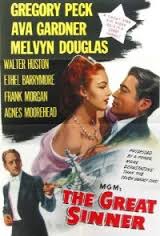
THE GREAT SINNER
US, 1949, 110 minutes, Black and white.
Gregory Peck, Ava Gardner, Melvyn Douglas, Walter Huston, Ethel Barrymore, Frank Morgan, Agnes Moorhead.
Directed by Robert Siodmak
The Great Sinner is a gambler. This film is loosely based on the life and experience and writings of Fyodor Dostoevsky. (There was a film version of Dostoevsky's The Gambler directed by Karel Reisz with James Caan in 1975.)
This film is one of M.G.M's elegantly mounted, beautifully photographed in black and white melodramas of the '40s. It has a very strong cast - a young Gregory Peck upright and then desperate in the central role, a beautiful Ava Gardner, Walter Huston at his crustiest, Melvyn Douglas at his most sinisterly suave. There are short guest performances, most effective, by Frank Morgan as a gambling professor and Ethel Barrymore as the Walter Huston's mother - sinisterly dying at the gambling table. There is a great deal of glamour as well as moralising, with specifically Christian dialogue and Christ-figures for the significance of the gambler and his sinfulness. Direction is by Robert Siodmak, director or a number of thrillers of the '40s including The Spiral Staircase. Elegant and interesting.
1. The impact of the film? Interest? The exploration of character, motivations and obsessions, gambling and drives? Period piece?
2. M.G.M. production values: sets, costumes, atmosphere? Black and white photography? Musical score and atmosphere?
3. The strengths of the stars, their star quality, credible performances?
4. The structure of the film and its effectiveness: the voice-over by Fedja? Gregory Peck's sincerity and moralising, self condemnation? The collapse and seeming dying with the flashbacks? Seeing Fedja in degradation? With Pauline? His explicit Christ grace and sinfulness language? The flashback and building up the picture of Fedja's decline and fall? The ending with the prospect of redemption, happiness?
5. The title and its religious tones? Weakness, vice, lies, the transformation of the innocent and upright, obsession? The significance of the specifically Christian language and images: the medal, the church,' the funeral, the focus on the crucifix and the ceremonies, the choir? The religious symbol of sinfulness, the need for redemption, generosity and charity? Repentance?
6. The relationship of the film to Dostoevsky, his experience, his novels? Art and reality? The dialogue highlighting the need for experience for the author? The focus on human character, conscience - the ego and the shadow? The upright man - pride and fall? Consumed by obsession? The possibility of being redeemed - by love, generosity? By self-expression and confession in the novel?
7. Gregory Peck as Fedja? A strong character? His interest in human nature for his writing. the train journey, the obsession with Pauline, the voice-over and his comment, her alluring him, his staying at the spa? observation, rationalising his interest? The life at the spa and its gentility? The general and his gambling, Pauline, the fascination with the professor and his continued losses? The encounter with Armand de Glasse? His observing the characters, observing detachedly the mathematics and chances of the gambling games? His wanting to save people from themselves?
8. The casino as a microcosm: 19th. century elegance, surface beauty, interior corruption? The effect on all who went to the casino? Exercising power, bad luck, the comments about despair and suicides? The general, his mother dying at the table? The degradation with borrowing, selling oneself and one's soul to such people as de Glasse, the professor and his train ticket, cashing it in, lies? An ugly world?
9. Fedja and his wanting to redeem the professor? His failure? His wanting to save the general and his daughter? Concern, involvement, the small beginnings, the win, the thrill of winning, the collage of luck - the growing pace of his wins all through the day, his nervousness, changing numbers, the closing of the bets? His getting enough money to save the general and Pauline? The encounter with de Glasse - and his shrewd refusal to let him pay the debt? His being tempted back to the tables? His growing in love with Pauline - going out with her yet going back to the table? Going downhill? Paralleling the degradation of the professor (and the significance of his funeral)?
10. Fedja as driven, losing all his money, offering his royalties to de Glasse, the growing insanity of his wanting to continue the games and raise the stakes? The Dr. Faustus imagery of his selling himself? Alone, victim of others and himself, unkempt, collapsing? His being driven to write?
11. How well did the film explore visually gambling, the gambling type, the risks, luck, numbers and patterns?
12. Pauline and her beauty, her reaction to Fedja, his calling her corrupt - and his later regretting this? Her bound to de Glasse and about to marry him? Her father? The change in her attitude, falling in love with Fedja? Her dismay at his downfall? Her reading his manuscript - and the prospect of a future?
13. The general and his reputation, borrowing from de Glasse, being bound to him, his gambling, his debt to Fedja? His dismay at Fedja's downfall?
14. His mother - and the telegrams announcing her illness and father and daughter not caring? Her arrival? Ethel Barrymore's presence and style? Playing games, her cynical remarks, gradually getting interested in the games, going to the tables - the raising of the stakes? Her silently dying at the table?
15. The sketch of the professor, his appearance, the comic touches, the compulsive gambling, his explanations, his lies? The fare and his cashing it in? Collapse, death? Funeral? The apparition to Fedja a shadow warning of gambling?
16. De Glasse and the icy sound of his name? Power, management, corrupt. ruthless? Hold over the general and Pauline? Manipulating Fedja into gambling? His revenge on Fedja's trying to save the professor?
17. The finale with an atmosphere of conversion and repentance. the therapeutic effect of writing the novel? Pauline reading it?
18. The atmosphere of the 19th. century., 19th. century lifestyle., fiction?
Published in Movie Reviews
Published in
Movie Reviews
Tagged under